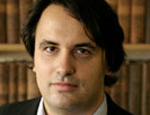Expert comment

10 December 2014
QMUL's Dr Christopher Phillips argues that despite a weaker economy and the domestic threat of ISIS, Moscow is unlikely to change course on Syria.

10 December 2014
It's been a bad week for Ukip, but according to QMUL's Dr Rainbow Murrary, it's not the only party failing women.

4 December 2014
The world was enraptured last month as the Rosetta mission’s Philae lander made its historic landing on comet 67P/Churyumov-Gerasimenko. QMUL’s Professor Iwan Williams had more reason than most to be interested, as he was one of a team of investigators working the CONSERT instrument that is part of the mission. Here he explains what CONSERT is trying to find out and how it took on a vital new function after the landing.

4 December 2014
In this article, Rafael Leal-Arcas, of QMUL’s Centre for Commercial Law Studies (CCLS), argues that our system of global energy governance is ad hoc and in need of reform.

3 December 2014
In a joint article with Hans-Olaf Henkel, QMUL’s Professor Brigitte Granville analyses the mounting woes of François Hollande’s beleaguered presidency.

20 November 2014QMUL's Marius Ionut Calu analyses the impact of last week's Romanian elections, and suggests that the surprise result may be indicative of a changing society and maturing democracy.

19 November 2014
According to Professor Tim Bale, Ed Miliband can avoid a damaging split between his party's 'beer drinkers' and 'wine drinkers' on immigration - but he shouldn't rely solely on economic arguments.

12 November 2014
Professor Valsamis Mitsilegas argues that we need clarity on the European Arrest Warrant so that this logical and useful legal instrument does not fall victim to an emotive political bun fight.

5 November 2014
Emma Sanderson-Nash, Lecturer in Politics at Queen Mary University of London, argues that Norman Baker's resignation tells us more about the man that it does about the health of the coalition.

5 November 2014
Dr Clive Gabay, specialist in African politics and Senior Lecturer at Queen Mary University of London, analyses events in Zambia following the death of President Michael Sata.

28 October 2014
Initial results from Ukraine’s parliamentary elections have thrown down a challenge to the European Union, according to Russia expert and QMUL Research Fellow Dr Eleanor Bindman.
24 October 2014
Professor Allyson Pollock replies to questions on the Ebola crisis – originally asked prior to the BBC Politics show on 19 October

24 October 2014
As the nation prepares to elect a new parliament on 26 October, Dr Eleanor Bindman, specialist in Russian politics and Research Fellow at QMUL’s School of Politics and International Relations, looks at what might lie ahead for the region.

2 October 2014
Koen Slootmaeckers, PhD candidate at Queen Mary University of London, writes about Sunday's LGBT Pride parade in Belgrade, and explores the implications for Serbian politics and the county's path to the EU.

1 October 2014
Dr Richard Baxter critiques the ongoing public debate about the UK high-rise and argues that the environment has still not been fully explored

1 October 2014
It’s 32 months until the French presidential elections in 2017 and former president Nicolas Sarkozy's return to centre stage promises to make French politics a lively affair in the meantime.

25 September 2014
Dr Sarah Wolff explains how, with presidential and legislative elections on the horizon, and mounting geopolitical chaos and insecurity, Tunisia feels that Europe and America is “leaving it in the lurch” at a critical time.

24 September 2014
Tim Bale, Professor of Politics at Queen Mary University of London, reflects upon Ed Miliband's party conference speech and concludes that it "just about did the job".

24 September 2014
What's in a smile? Colin Jones, Professor of History at Queen Mary University of London, writes about royal teeth, power, and the smile revolution.

19 September 2014
Dr Robert Saunders, Lecturer in Modern British History at Queen Mary University of London, argues that promises made in the final weeks of the campaign may result in a political hangover for David Cameron and his government.

18 September 2014
Professor Perri 6 from QMUL's School of Business and Management explores the implications for civil servants and the national interest in the event of a Yes vote in the Scottish referendum.

18 September 2014
Katharine Jenner, Lecturer in Nutrition and Public Health at QMUL, asks - should we be eating sugar at all?

12 September 2014
Dr Nick Bryan-Kinns, Reader in Interaction Design in the School of Electronic Engineering and Computer Science tells us about his latest research into how sighted and visually impaired people use touchscreen devices that they can’t see. This paper won the Best Short Paper prize at the Human Computer Interaction Conference 2014.

11 September 2014
Dr Clive Gabay, Senior Lecturer in politics at Queen Mary University of London, looks ahead to the expiration of the Millennium Development goals and asks if we're destined to repeat the same mistakes.

11 September 2014
Dr Sophie Harman argues that while the inadequate international response has compounded the Ebola crisis, it is the region’s chronically weak and desperately resourced health infrastructure which is the critical factor.

9 September 2014
Dr Tessa Wright, Senior Lecturer from QMUL's School of Business and Management, reflects on the success of the Women into Construction project.

18 August 2014
Dr Rainbow Murray of QMUL's School of Politics and International Relations argues that it is time to "reframe gender quotas as quotas for men."
7 August 2014
Professor Tim Bale reflects on Boris Johnson’s planned return to the House of Commons, and asks if he has what it takes to make it to the top.

11 July 2014
By Shafi Ahmed, Associate Dean at Queen Mary University of London and Colorectal Cancer Lead at Barts Health NHS Trust

16 June 2014
Online dispute resolution (ODR) offers an invaluable means of access to justice for consumers who have a dispute with a business, but are deterred by the costs and barriers involved from going to court.